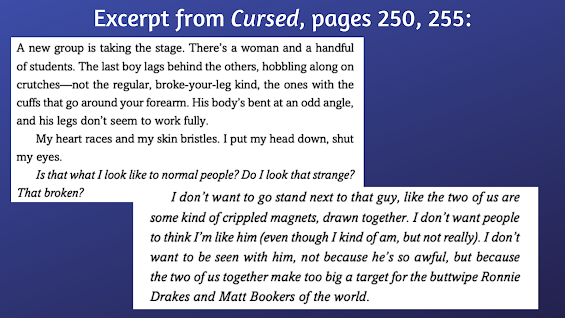I have a confession: I read reviews. I know I shouldn’t. I’ve been strongly advised against doing so, but at a certain point I made the decision that, for me, the thrill of a good review outweighed the sting of a bad one.
That’s why it’s so uncomfortable when I’m made aware of a misstep.
Since its publication, I’ve learned that my novel Cursed has a level of ableism that doesn’t sit well with some readers. There was some ableism I wasn’t even aware of. For example, I’d used the words “crazy” and “insane” throughout the book, only learning after the fact that doing so perpetuates the stigma around mental health conditions. Charlesbridge Teen offered to swap out those words in the Cursed paperback, for which I was incredibly grateful.
Conversely, I’d made a conscious decision to include a good bit of internalized ableism in the story. My main character Ricky was able-bodied for the first 13 years of her life, as was I. Thus, following her chronic illness diagnosis, she had to deal with a lot of internalized ableism. I thought it was important to show her growth through and beyond that.
I struggled with one scene in particular where her journey comes to somewhat of a head. Ricky eventually course-corrects her ableist assumptions, but as I was editing, I wondered: Does this go too far?
I asked a disabled friend to read the scene, and he thought I was okay. In retrospect, I realized that the friend I’d asked has incredibly thick skin. Maybe I should have consulted additional readers, particularly teens? Maybe I should have taken my own discomfort with the scene as an indication that I should tone it down a tad?
But I didn’t do any of that.
And a recent GoodReads reviewer let me know that, in his eyes, I’d messed up.
 |
| Excerpt from the GoodReads review. |
Ouch. For me—but more importantly, for him.
The review itself was generous, 4 out of 5 stars, with the reviewer noting that he has cerebral palsy and saying I’d really gotten the “living with chronic pain” experience right.
Ultimately, I stand by the scene, while also accepting that I let this reader down—someone thrilled to see himself accurately reflected, finally...only to get what felt like a slap in the face later on in the book.
The moral of this awkward story is that—whether we’re intentionally pushing boundaries in an attempt to make a point or unknowingly using harmful stereotypes and insensitive language when we really should have known better—none of this stuff is easy.
I do my best. That’s all any of us can do.
My thanks to Lee Wind for inviting me to share some of my thoughts here on the Official SCBWI Blog this month.
Happy creating everyone!
KAROL RUTH SILVERSTEIN (she/her/disabled) is a screenwriter and writer of various genres of children’s books. Originally from Philadelphia, Karol now lives in West Hollywood with her incredibly fluffy cats, Ninja and Boo.
Follow her on Twitter @KRSilverstein,
Instagram @KRSilverstin2019 and
Facebook AuthorKarolRuthSilverstein.
For interviews, author videos, disability-related articles, upcoming events, etc. go to www.karolruthsilverstein.com




This post is brave and honest - like your book, Karol, and you! Thanks for sharing these posts as our January 2022 guest blogger! We're cheering you on.
ReplyDeleteLee
Thank you for sharing your experience and your perspective. I had genuinely assumed that internal thoughts were fair game for inappropriate language and opinions. I now believe my dyslexic protagonist does not need to be so explicit about his worst fears. I will seek further input from stakeholders.
ReplyDelete